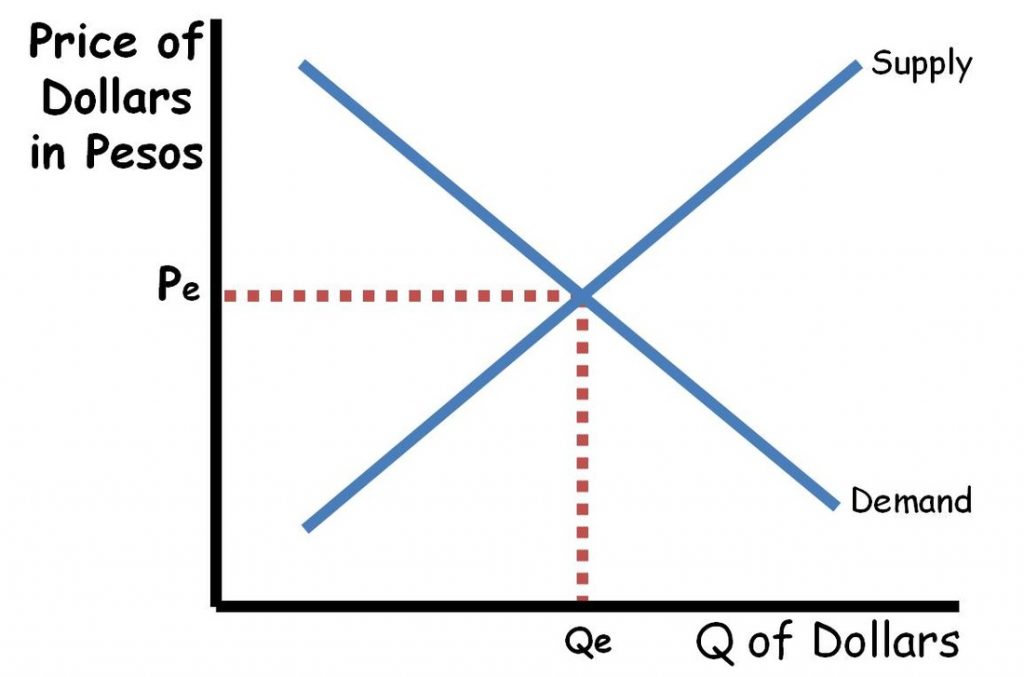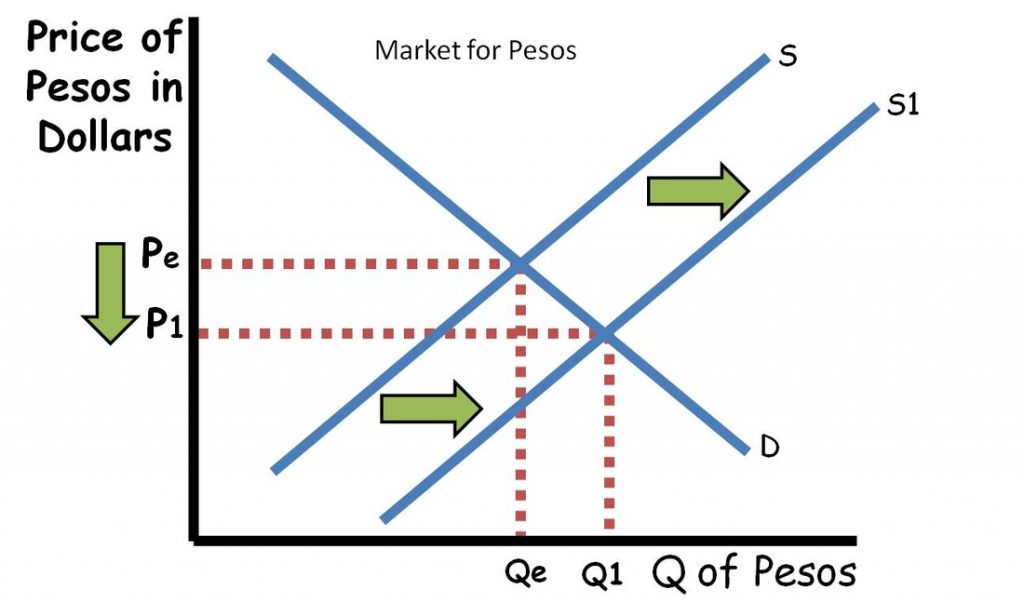What is foreign exchange market in economics? This intriguing concept lies at the heart of international trade and finance, shaping the global economy in myriad ways. In this comprehensive guide, we embark on a journey to unravel the complexities of the foreign exchange market, exploring its participants, factors influencing exchange rates, types of transactions, regulations, and profound impact on economies worldwide.
Delving into the world of foreign exchange, we will discover how currencies are bought, sold, and traded, facilitating international commerce and investments. We will examine the diverse players involved, from banks and corporations to individuals, and their motivations for participating in this dynamic market.
Definition of Foreign Exchange Market

The foreign exchange market, also known as the forex market or currency market, is a global marketplace where currencies are traded. It’s the largest financial market in the world, with an average daily trading volume of over $5 trillion.
Browse the multiple elements of foreign currency exchange market mall calgary to gain a more broad understanding.
Foreign exchange is the process of converting one currency into another. It’s essential for international trade, as it allows businesses to buy and sell goods and services from other countries. The foreign exchange market also plays a role in investment and speculation.
Purpose and Function of the Foreign Exchange Market
The primary purpose of the foreign exchange market is to facilitate the exchange of currencies for international trade and investment. It also serves several other functions:
- Price discovery: The foreign exchange market determines the exchange rates between currencies based on supply and demand.
- Liquidity: The foreign exchange market is highly liquid, meaning that it’s easy to buy and sell currencies quickly and efficiently.
- Risk management: Businesses and investors can use the foreign exchange market to manage their exposure to currency fluctuations.
Participants in the Foreign Exchange Market
The foreign exchange market involves a diverse range of participants, each playing a unique role in the facilitation and execution of currency transactions. These participants can be broadly classified into the following categories:
- Banks: Commercial banks and investment banks are the primary participants in the foreign exchange market. They act as intermediaries between buyers and sellers, facilitating the exchange of currencies and providing liquidity to the market.
- Corporations: Multinational corporations and businesses engaged in international trade and investment actively participate in the foreign exchange market to manage their currency exposure and facilitate cross-border transactions.
- Individuals: Individual traders, tourists, and investors also participate in the foreign exchange market for various purposes, such as travel, remittances, and speculative trading.
The motivations of these participants vary depending on their specific roles and objectives in the market. Banks aim to profit from the bid-ask spread and provide liquidity to their clients. Corporations seek to manage their currency risk and optimize their foreign exchange transactions. Individuals engage in the market for personal financial management, travel, or investment purposes.
Factors Influencing Foreign Exchange Rates

The value of currencies in the foreign exchange market is influenced by a complex interplay of economic, political, and financial factors. These factors can have significant impacts on the exchange rates between currencies, making it crucial for businesses and individuals involved in international trade and finance to understand their dynamics.
Economic Conditions
The economic health of a country plays a major role in determining the value of its currency. Factors such as GDP growth, inflation, unemployment, and trade balance all influence the perception of a country’s economic stability and its currency’s attractiveness to investors.
- Strong economic growth typically leads to an appreciation of the currency, as it indicates a growing demand for the country’s goods and services, making its currency more valuable.
- High inflation can erode the value of a currency, as it reduces the purchasing power of individuals and businesses within the country.
- Low unemployment can indicate a strong labor market and boost the currency’s value, as it suggests a healthy economy with increased consumer spending and business investment.
- A positive trade balance, where exports exceed imports, can strengthen a currency as it indicates a high demand for the country’s goods and services in the global market.
Political Stability
Political stability and the perceived risk associated with a country can significantly influence the value of its currency. Factors such as government stability, corruption levels, and geopolitical tensions all play a role in determining the confidence of investors in a country’s economy.
In this topic, you find that foreign exchange market today philippines is very useful.
- Political instability, such as civil unrest or frequent changes in government, can lead to a depreciation of the currency as investors become more risk-averse and withdraw their investments.
- Corruption can erode trust in a country’s economy and weaken the value of its currency.
- Geopolitical tensions, such as trade disputes or military conflicts, can increase the perceived risk associated with a country and lead to a depreciation of its currency.
Interest Rates
Interest rates set by a country’s central bank play a crucial role in determining the value of its currency. Interest rates influence the flow of capital into and out of a country, affecting the demand for its currency.
- Higher interest rates typically lead to an appreciation of the currency as they attract foreign investors seeking higher returns on their investments.
- Lower interest rates can lead to a depreciation of the currency as they reduce the incentive for foreign investors to hold the currency.
Types of Foreign Exchange Transactions
The foreign exchange market facilitates various types of transactions that cater to different needs and time frames. These transactions can be broadly categorized into three main types: spot transactions, forward transactions, and swaps.
Spot Transactions
Spot transactions are the most straightforward type of foreign exchange transaction. They involve the immediate exchange of currencies at the prevailing market rate, also known as the spot rate. Spot transactions are typically settled within two business days.
Understand how the union of foreign exchange market news can improve efficiency and productivity.
Forward Transactions
Forward transactions are contracts to exchange currencies at a predetermined rate on a specified future date. These transactions allow businesses and individuals to hedge against potential fluctuations in exchange rates and lock in a favorable rate for future transactions.
Swaps
Currency swaps are agreements between two parties to exchange currencies for a specified period, typically ranging from a few days to several years. Swaps involve the exchange of both principal and interest payments, and are often used to manage currency risk or speculate on exchange rate movements.
Foreign Exchange Market Regulations
The foreign exchange market is a global and decentralized market, and thus requires regulations and policies to ensure its stability and integrity. These regulations vary from country to country, but generally aim to:
– Prevent market manipulation and insider trading
– Protect investors and ensure fair competition
– Facilitate the smooth functioning of the market
Role of Central Banks
Central banks play a crucial role in regulating the foreign exchange market. They have the authority to:
– Set interest rates, which influence the value of a country’s currency
– Intervene in the market to buy or sell currencies, thereby stabilizing exchange rates
– Issue regulations and guidelines for market participants
Other Regulatory Bodies
In addition to central banks, other regulatory bodies may also play a role in overseeing the foreign exchange market. These include:
– Securities and Exchange Commissions (SECs)
– Financial Conduct Authorities (FCAs)
– International Monetary Fund (IMF)
These bodies work together to ensure that the foreign exchange market operates fairly and efficiently, and to prevent systemic risks.
Impact of Foreign Exchange Market on the Economy

The foreign exchange market plays a crucial role in facilitating international trade, investment, and economic growth. Currency fluctuations can significantly impact businesses and individuals, influencing prices, profits, and investment decisions.
Impact on International Trade
Currency fluctuations affect the cost of imported and exported goods. When a country’s currency appreciates, its exports become more expensive, potentially reducing demand from foreign buyers. Conversely, a depreciation makes exports cheaper, boosting demand.
Impact on Investment
Currency fluctuations can influence foreign direct investment (FDI). Investors tend to favor countries with stable currencies and positive economic outlooks. A strong currency can attract FDI, while a weak currency may deter investors.
Impact on Economic Growth
Stable exchange rates promote economic growth by reducing uncertainty for businesses and investors. Currency fluctuations can disrupt supply chains, impact corporate profits, and affect consumer spending.
Examples of Currency Fluctuations
- In 2018, the Chinese yuan depreciated against the US dollar, making Chinese exports more competitive and boosting its economy.
- In 2022, the Russian ruble plunged after the imposition of Western sanctions, impacting Russian businesses and individuals.
Technology and the Foreign Exchange Market: What Is Foreign Exchange Market In Economics
Technology has revolutionized the foreign exchange market, transforming it from a manual, over-the-counter process to a highly automated, electronic one. The advent of electronic trading platforms, such as EBS and Bloomberg, has enabled traders to execute orders in real-time, with increased speed and efficiency.
Electronic Trading Platforms
Electronic trading platforms have revolutionized the way foreign exchange is traded. These platforms connect buyers and sellers from around the world, providing them with a centralized marketplace to execute trades. The use of electronic trading has reduced transaction costs, increased market transparency, and improved liquidity.
Other Technological Advancements
In addition to electronic trading platforms, other technological advancements have also had a significant impact on the foreign exchange market. These include:
- High-frequency trading: High-frequency trading algorithms use sophisticated computer programs to execute a large number of trades in a short period of time.
- Blockchain technology: Blockchain technology is being explored as a way to improve the efficiency and security of foreign exchange transactions.
- Mobile trading: Mobile trading apps allow traders to access the foreign exchange market from anywhere, at any time.
These technological advancements have made the foreign exchange market more accessible, efficient, and transparent. They have also increased the speed and volume of trading, leading to greater market liquidity and volatility.
Case Studies of Foreign Exchange Market Events
The foreign exchange market is a complex and dynamic environment, and its history is marked by several significant events that have had a major impact on the global economy. These events can provide valuable insights into the factors that influence exchange rates and the potential risks and rewards involved in currency trading.
The Plaza Accord (1985)
The Plaza Accord was an agreement reached by the G-5 countries (the United States, Japan, France, the United Kingdom, and West Germany) in September 1985. The main objective of the accord was to address the persistent trade imbalances between the US and Japan, which had led to a sharp appreciation of the Japanese yen against the US dollar. The agreement resulted in a coordinated intervention in the foreign exchange market by the G-5 countries, which led to a significant depreciation of the yen and an appreciation of the US dollar. The Plaza Accord is widely regarded as a landmark event in the history of the foreign exchange market, as it marked a shift away from the fixed exchange rate system that had been in place since the Bretton Woods Agreement in 1944.
The Asian Financial Crisis (1997-1998), What is foreign exchange market in economics
The Asian Financial Crisis was a severe financial crisis that began in Thailand in July 1997 and spread to other countries in Southeast Asia, including Indonesia, Malaysia, and South Korea. The crisis was caused by a combination of factors, including excessive lending by banks, a property bubble, and a lack of regulation. The crisis led to a sharp depreciation of the currencies of the affected countries and a loss of confidence in the financial systems of the region. The Asian Financial Crisis had a significant impact on the global economy, as it led to a decline in trade and investment in the region.
The Global Financial Crisis (2007-2008)
The Global Financial Crisis was the most severe financial crisis since the Great Depression of the 1930s. The crisis began in the United States with the collapse of the subprime mortgage market and spread to other countries around the world. The crisis led to a sharp depreciation of the US dollar and a loss of confidence in the global financial system. The Global Financial Crisis had a significant impact on the global economy, as it led to a decline in trade and investment and a rise in unemployment.
The Swiss Franc Peg Removal (2015)
The Swiss franc peg removal was a surprise announcement by the Swiss National Bank (SNB) in January 2015 that it would no longer maintain a peg between the Swiss franc and the euro. The decision led to a sharp appreciation of the Swiss franc against the euro and other currencies. The SNB’s decision was motivated by concerns about the strength of the Swiss franc and its impact on the Swiss economy. The Swiss franc peg removal had a significant impact on the foreign exchange market, as it led to increased volatility and uncertainty.
Last Point
In conclusion, the foreign exchange market stands as a cornerstone of the global financial system, facilitating international trade, investment, and economic growth. Its complexities and intricacies shape the value of currencies, influence business decisions, and impact the lives of individuals around the world. As we continue to navigate the ever-evolving landscape of the foreign exchange market, a deep understanding of its workings empowers us to make informed decisions and adapt to its dynamic nature.
